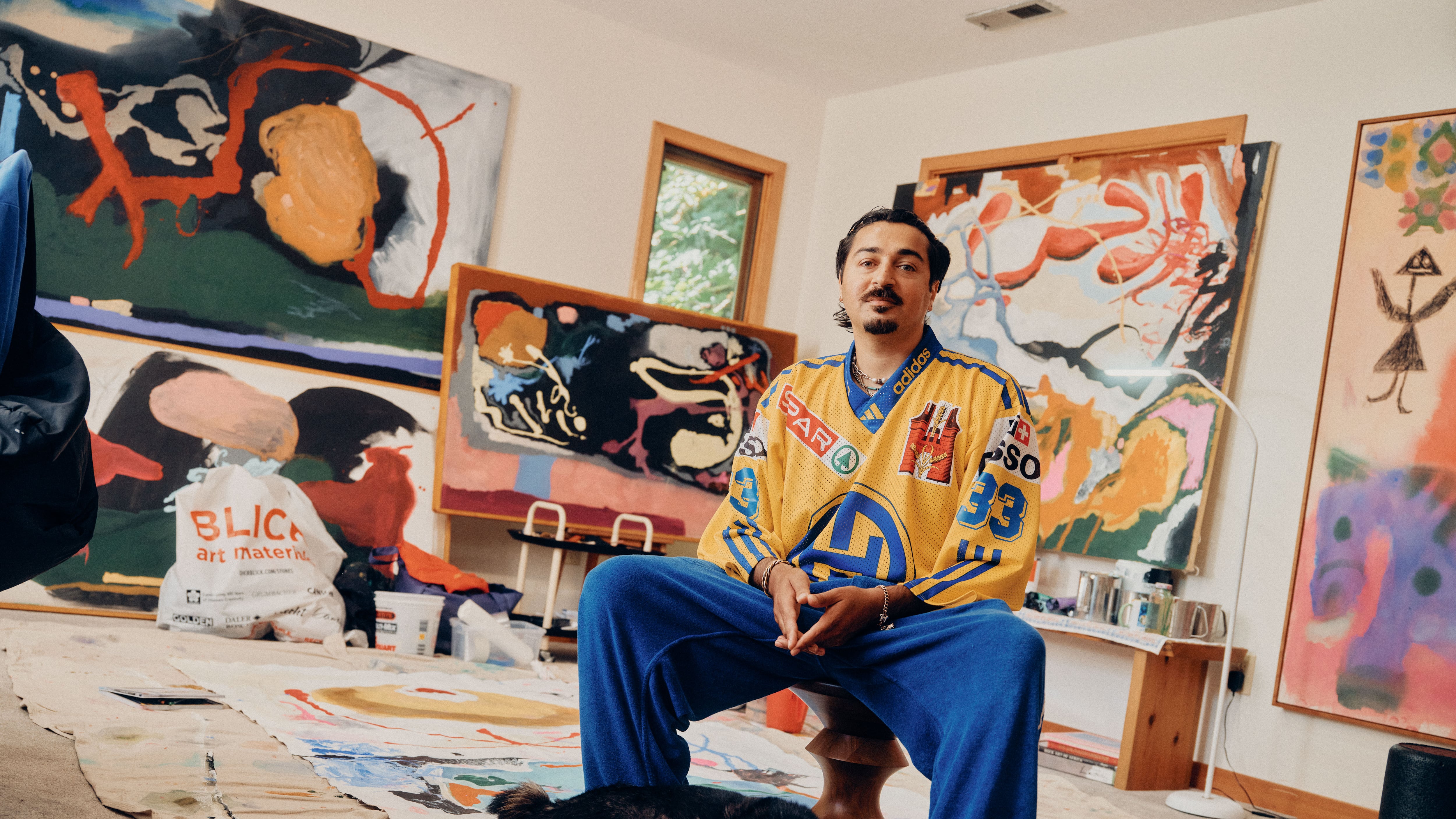For artist and designer Ali Godil, spirituality is integral to both his artwork and his environment.
From the prayer rugs that adorn the floors of almost every room to the vibrant works displayed on the walls, there’s an undeniable sense that Godil’s West Hills home is more than a stylish family dwelling, a dynamic artist’s studio, or a comfortably woodsy reprieve from the bustle of downtown—it’s a sanctuary.
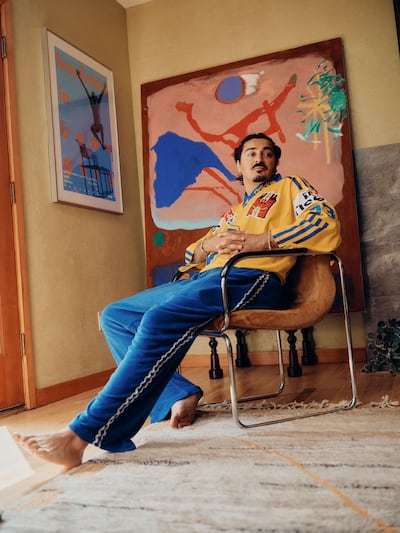
A first-generation Pakistani American, Godil is a creative director, designer, and visual artist whose global perspective permeates not only his award-winning design work, but also every corner of the home he shares with his 2-year-old daughter, Heela. Elements of futuristic midcentury design mingle with stark brutalist pieces in bright, airy spaces. Folk art from West Africa and spiritual art from Northern Mexico adorn creamy, sun-dappled walls. Dreamily intricate artworks influenced by Islamic calligraphy hang near oil paintings of the American Wild West. The influences that inform Godil’s space are vast and varied, yet they come together to form a stunning and coherent collection.
“I curate objects that inspire me,” Godil says as he welcomes us into his living room, a large space with vaulted ceilings, creamy walls, and breathtaking windows overlooking his verdant drive. He gestures broadly. “My aesthetic is French countryside mixed with Oregon farm life, mixed with fine art, Euro, and Islamic art.”
And true to Godil’s appreciation for what he describes as “psychedelic wabi-sabi,” these distinctly iconic yet brazenly divergent designs all somehow complement each other effortlessly.
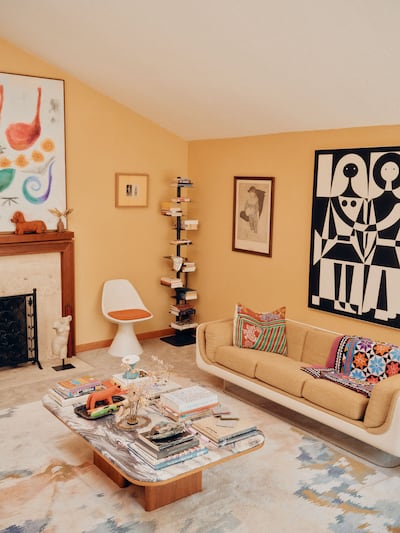
The melodic discord of the room reinforces his statement: A handcrafted hardwood chair with a carved trout as a backrest sits across from a gleaming white-and-orange Space Age seat and two Pierre Cardin dining chairs from the 1980s. An imposing black wood, African brutalist-style coffee table covered in culture-specific books centers the room. Under framed lithographs of Paul in a Clown Suit by Pablo Picasso, an Alexander Girard Black & White Environmental Enrichment Panel, and an untitled piece by Marc Chagall sits an ultramod white and beige couch where Godil’s grandmother’s quilt—a multihued work whose vibrant palette weaves its way through nearly every room of the home—rests on one arm.
He holds the blanket up to display its crisp geometric patterns in full. “This is one of my favorite things in the house,” Godil says. “It comes from Pakistan, where my family is from, so it’s like being wrapped up in your ancestors.”
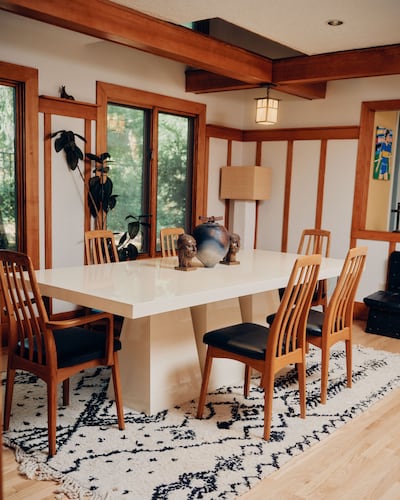
Such is the energy throughout the home: distinctly iconic yet brazenly divergent designs, all somehow complementing each other effortlessly. In the entryway, a Benin-era African mask welcomes visitors alongside contemporary Native American motifs. In the dining space, a stark white African brutalist dining table displays a Japanese raku-fired vessel flanked by two Native busts.
“Because I love contrast,” Godil says.
The home flows naturally from the living room to the formal dining room and into the kitchen and breakfast nook, which then unfurl into a family room.
In his modern, renovated kitchen, a nook holding Godil’s chrome espresso machine draws particular attention, as do the handmade Moroccan tiles accenting his coffee alcove and backsplash. “Every tile is unique,” Godil says. “I have it all around the house. This craft supports artisans from my homeland, and each tile is one of one.”
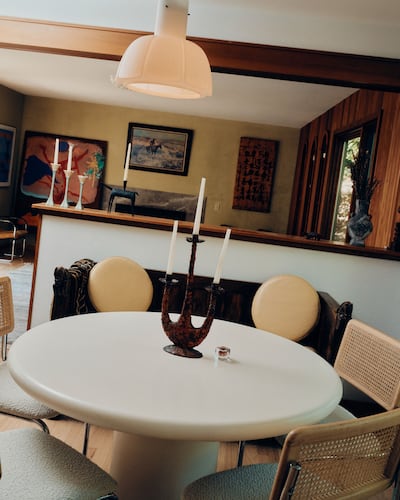
Godil’s pale, blush-colored kitchen opens into a breakfast nook decorated with more of his abstract artwork, anchored by a round midcentury table and chair set beneath a Dutch-made milk glass lamp, vaguely reminiscent of a tulip. Godil had the lamp specially rewired (shout-out to Hippo Hardware) to replace the Dutch wiring. “I love milk glass,” Godil says, holding up a half-full milk glass coffee mug and smiling into the lamp’s buttery light.
In Godil’s family room, lime-washed walls and low, retro couches flank a plush Turkish rug. More midcentury influence rounds out the seating, with modular “lover’s/waiting room” benches occupying either side of a low wall that separates the family room from the kitchen and nook area, carrying the retro influence throughout. In the family room, a custom accent wall designed by Godil displays various treasures from his vast collection, arranged in alcoves reminiscent of religious niches holding sacred artifacts.
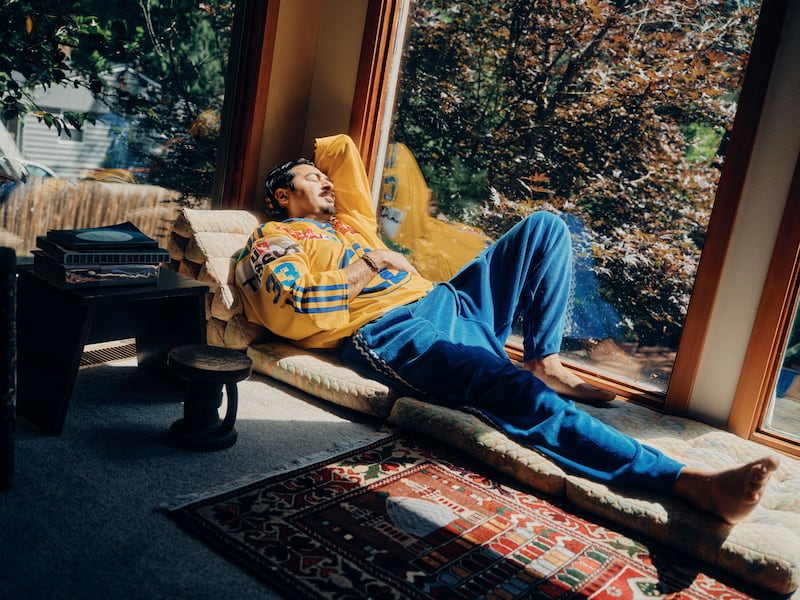
Godil’s studio is located on the top floor of the three-story home (the second story is reserved for bedrooms, a walk-in closet full of vintage soccer jerseys, and Godil’s fantastic bathroom, renovated with quartz counters and terrazzo floor tiles). Here, he works on his paintings, many of which are on display or in progress. At his desk, the psychedelic wabi-sabi Godil extols is apparent—a colorful, creative chaos familiar to anyone working from home. “You’ve got your crystals for energy, your reference books, oh, and here’s another prayer rug,” he says.
“It’s kind of like an ashram, right?” Godil asks. We nod in agreement.
0 of 14
Click here for more Nester Magazine.
Nester Magazine is free, distributed all over Portland, and can be found at these locations.
